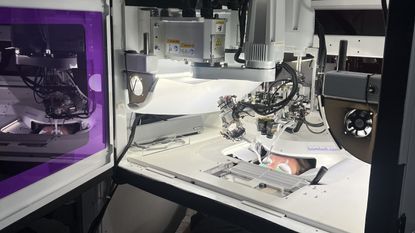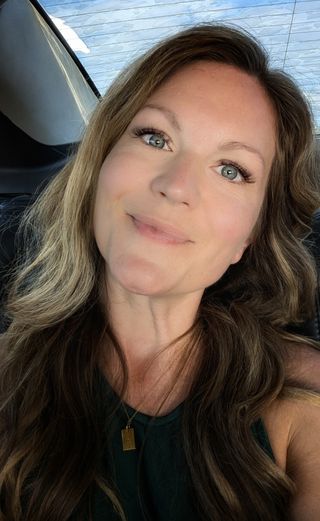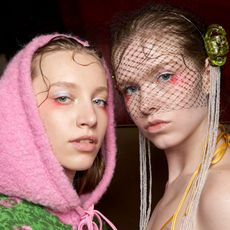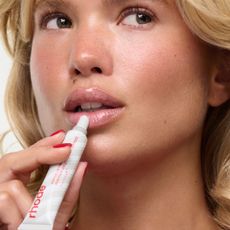An AI Robot Gave Me Eyelash Extensions and The Process Was So Easy
Is this the future of beauty?


Amidst rush hour traffic leaving the San Francisco airport, I was running late and had less than an hour to get a full set of eyelash extensions before heading to dinner. Just across the bridge in Oakland at LUUM Lash, an AI robot was ready and waiting.
While I love the look of eyelash extensions, I didn't want to spend two to three hours of my NorCal vacation sitting for a traditional appointment. Instead, I zipped into the cutting-edge LUUM lash salon for a high tech alternative. The salon utilizes a proprietary technology, including computer vision and artificial intelligence, to program a robot to apply eyelash extensions. I loved the idea of the classic beauty treatment receiving a technology overhaul, but I'll admit I felt nervous about having a robot so close to my eyes. Still, with little time to spare, I decided to give the futuristic treatment a go.
How Does a Robot Apply Lash Extensions?
The appointment at LUUM began just like a typical eyelash extension appointment—minus the robot. Upon arriving at the salon, I had a consultation with a lash artist who recommended the shape and length of extensions that would suit me best (I went with "cateye" and "natural"). Then I laid down on the spa table and she gently washed my lashes to prep them for the application. She then applied two pads on each eye—one across the lid and one underneath my eye. While this felt similar to traditional eyelash prep, there was one important difference—the eye pads have a barcode on them to help the robot find the lash area. This then guides the computer vision of LUUM’s LashTechnology through the markers.
After the prep work was done, my lash artist adjusted the table and lowered the robot, named Farrah, over my face to begin its work. At first, I felt apprehensive, but a few whisper light swishes of the machine later (LUUM describes the sensation as “butterfly kisses”), I began to find the application process surprisingly soothing. While my eyes were closed the whole time, my lash artist told me that one arm of the robot was isolating a natural lash while another arm picked up a lash extension, dotted it with adhesive, and applied it to my eyelash.
During the application, the lash artist (who stood in the room with me for the entire treatment) explained that the extensions were cured with blue light. This helps them dry much faster than adhesive alone and stay on longer. I learned that some traditional lash extension treatments use this blue light as well, but it was the first time I had encountered the technology. For me, the blue light bonding didn't seem to make the lashes stay on significantly longer, but I was relieved to know that the lashes were instantly dry, so I could shower later that night without worrying about getting the extensions wet.
Once the robot finished my first eye, the lash artist switched the machine to the second for another 15-20 minutes of application (LUUM is currently working on a next gen robot that can work on both eyes at once). Once that was done, the lash artist removed the machine and applied an additional five to six extensions throughout the lash line, customizing the placement for a truly bespoke experience. This included touching up spots that the robot had a tough time reaching, like the inside corner of each eye.
The Benefits of A Robot Applying Your Lash Extensions
The best part about getting eyelash extensions, either traditional or from a robot, is that you have semi-permanent lashes that last about three weeks. During that time your lashes are long, a glamorous shade of black, with a perfect curl. But turning to technology for this treatment feels like a wise choice since it's a long, repetitive process that takes a human lash artist up to two or three hours to apply a full set.
Stay In The Know
Get exclusive access to fashion and beauty trends, hot-off-the-press celebrity news, and more.
Lash extensions require an intense amount of concentration and precise dexterity on behalf of the artist. Comparatively, with this type of AI technology, the artist can leverage the robot to apply the bulk of the lashes while they offer aesthetic consultation and artistic final touches for each client.
There are benefits of AI from a business perspective as well. LUUM estimates that a salon can service three times as many customers with the robot compared to human lash application. Plus, with a shorter time commitment, it will be easier for lash fans to embrace extensions as a regular part of their beauty routine.
The Risks of Lash Extensions from a Robot
Most of my friends got wide-eyed when I told them I was getting robot lash extensions. The big question was ,“Is it safe?” The company assured me that the technology had been tested and approved by a fleet of doctors, lawyers, investors, and risk-assessors, so I realized that this tech was likely much safer than lash extensions applied by a person (human error is real). The key is a magnetic release feature that stops the machine if you sneeze, twitch, or perform any other fast movement.
Still, one to two percent of people have a negative reaction to cyanoacrylate, the adhesive that LUUM and most traditional lash artists use to apply the eyelash extensions. And, as with all eyelash extensions, if you don’t take proper care of them, you risk breaking your natural lashes.

After my robot applied my lash extensions.
The Cost of Robot Lash Extensions
At LUUM, a full set of lashes costs $170 and refills are $80. Tipping is up to the customer and I'd recommend it—while the robot does the bulk of the lash extensions, the human technician still provides above-and-beyond service. Comparatively, I've seen traditional treatments range from $100 to $300 for a full set of extensions, depending on the location and quality of salon. While LUUM's only salon is in Oakland, they are collaborating with partners to expand, including a pop-up shop at the Nordstrom Valley Fair store in San Jose, California starting November 16, 2024.
Aftercare for Robot Lash Extensions
If you decide to get eyelash extensions, whether from a robot or a human, it’s important to take good care of them. You should avoid rubbing or tugging at your lashes, and you should use a gentle cleanser to clean them. There is no need for mascara when you have lash extensions, but if you use other eye makeup, you should avoid using any oil-based makeup remover as these can break down the adhesive. Look for skin care products that have been proven safe on lash extensions. For example, K-beauty brand Vitabrid C12 has a cleansing balm that has undergone the Matsukaze Eyelash Extension Oil Cleansing Evaluation Test that proved the balm wouldn’t compromise eyelash extensions.
Are Lash Extensions from a Robot Worth It?
Overall, I was impressed with my experience at LUUM Lash. The robot did a great job of applying my eyelash extensions and I love the way they look. I was thrilled with how fast the appointment was; I was out the door in under an hour compared to the usual multi-hour treatment. The time savings kept piling up as the weeks went on, too. Eyelash extensions have completely transformed my morning routine. Instead of a full face of makeup, I only swipe on some Cheekbone lip oil and a tinted moisturizer, leaving my eyes bare except for my dark, long lashes, which completely steal the show.
I will absolutely return to LUUM the next time I'm in Northern California. With a cost and quality that is typical of most high-end lash salons, the fast and futuristic take on this beauty treatment will become a regular appointment for me if they eventually expand to my city.
Michelle Stansbury is a San Diego-based freelance writer who writes about travel, food, and relationships. Misuse of the word "literally" drives her figuratively insane.
-
 Yes, I Absolutely Want To Smell Like a Marshmallow, Thank You So Much
Yes, I Absolutely Want To Smell Like a Marshmallow, Thank You So MuchLet's get toasted.
By Samantha Holender Published
-
 Hailey Bieber Wants to Give You Frosted Lips for Christmas
Hailey Bieber Wants to Give You Frosted Lips for ChristmasHer limited-edition launch marks Rhode's first collaboration with influencer Matilda Djerf.
By Hanna Lustig Published
-
 Zendaya Pre-Games the Red Carpet in Birkenstocks and a Louis Vuitton Bag
Zendaya Pre-Games the Red Carpet in Birkenstocks and a Louis Vuitton BagThe definition of high-low fashion.
By Kelsey Stiegman Published